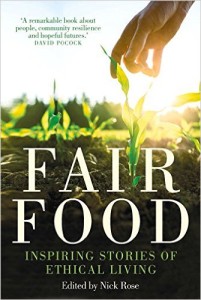Book Review: “Fair Food” edited by Nick Rose
by Jan
 This book is a compilation of chapters written by people involved in local food production in one way or another. Nick Rose asked them to write a chapter about how their interest in the food production business, and how that came about.
This book is a compilation of chapters written by people involved in local food production in one way or another. Nick Rose asked them to write a chapter about how their interest in the food production business, and how that came about.
The main question is why did they write it? Because the food system is broken.
Here’s what Nick wrote in his introduction – it’s the issue in a nutshell:
Why is it broken?
Because we have fully applied the technologies and the mindset of industrialisation to food and farming. And because we have combined industrialisation with the logic and the imperative of endlessly increasing production, regardless of the consequences.
What does that mean? It means we have over-exploited our land, degraded our soils and damaged our river systems. It means Australia has one of the highest rates of deforestation, biodiversity loss and species extinction on the planet. It means, globally, that the food system contributes as much as 50 per cent of all greenhouse gas emissions.
It means that we have a supermarket duopoly that controls 70 to 80 per cent of the grocery market, forcing farmers and food processors to take whatever prices the duopoly offers. A hundred years ago farmers received 90 cents of every dollar’s worth of food they produced; today it’s around 10 cents.
Some of these participants, from different backgrounds, have endured setbacks but they are so passionate about food that they have battled on relentlessly to become agents of change. These people’s lives indicate that one has to be resilient to stick at being an activist in changing the food system, and for that reason they are inspirational. You get some political theory, education, advocacy, memoirs, and autobiography.
Nick Rose is the national co-ordinator of the Australian Food Sovereignty Alliance which initiated the first crowd-sourced food policy document, the People’s Food Plan.
Michael Croft is a farmer and stepped into international food politics; he asserts that the failure of the food system is associated with the illogical nature of neoliberalism. Angelo Eliades writes about the virtues permaculture. Tammi Jonas started as a self-confessed junk foodie, then a vegetarian who became an ethical pig breeder and butcher.
But as consumers, do we really have to cut and roll our own oats? Or kill and butcher our own meat to become responsible citizens? No, but reading this book means that one is not alone in trying to shop, eat enjoyably, and not waste food. And protest when large organisations want to frack, mine and destroy the food bowls of Australia. And there’s some comfort in knowing that.
Maybe the next book could address the methods of how these people farm and produce food, as well as their visions for the future of farming.